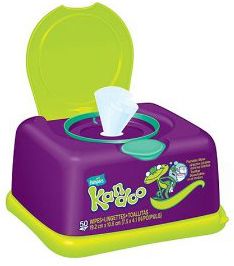Top Class Actions’s website and social media posts use affiliate links. If you make a purchase using such links, we may receive a commission, but it will not result in any additional charges to you. Please review our Affiliate Link Disclosure for more information.

According to P&G’s motion to dismiss the false ad class action lawsuit, the company alleges plaintiff David Machlan cannot seek injunctive relief because he cannot sufficiently demonstrate the likelihood that he will be harmed again in the future from the allegedly toilet-clogging hygiene wipes.
In response, U.S. District Judge James Donato has remanded the plaintiff’s claims for injunctive relief because of P&G’s alleged violations of California’s Consumer Legal Remedies Act, unfair competition, and false advertising laws back to California state court. According to the flushable wipes class action lawsuit, Judge Donato made this decision on the grounds that “A California state court ought to decide whether injunctive relief is appropriate for plaintiff’s claims.”
Judge Donato goes on to say, “Respect for comity and federalism compel that conclusion, and just tossing aside the state’s injunction remedy because of this court’s limited jurisdiction is an unwarranted federal intrusion into California’s interests and laws.”
Machlan originally filed this false ad class action lawsuit against P&G last year, alleging he bought a package of Pampers Kandoo wipes containing 350 wipes in total. According to the hygiene wipe class action lawsuit, Machlan “would use 1-2 wipes to clean and dry [his children after they went to the bathroom]. He immediately had problems flushing the wipes, as the toilet clogged and backed up. After he unclogged the toilet, he noticed that the toilet paper had partially decomposed, but the wipes were completely intact. Concerned about a risk of expensive plumbing repairs, he stopped flushing the wipes.”
Because of this incident, Machlan alleges he paid a premium for P&G’s Pamper Kandoo hygiene wipes because he was led to believe by P&G’s product advertisements that the wipes were flushable.
Originally, the plaintiff had filed his false ad class action lawsuit against P&G and Nehemiah Manufacturing Co.in California state court; however, both companies removed the proposed flushable wipes class action lawsuit to federal court under the Class Action Fairness Act.
According to Judge Donato, because the plaintiff’s claim for injunctive relief are not justiciable by a federal court, it is likely that this P&G hygiene wipes false ad class action lawsuit will be stuck in a permanent loop of refiling, removal, and dismissal. The judge goes on to say, “If such a scenario were to play out, plaintiff’s claims would likely be prevented from being adjudicated on the merits, definitely so once the statute of limitations on plaintiff’s claims expires.”
Of the claims contested by P&G in its motion to the dismiss the flushable wipes false ad class action lawsuit, Judge Donato did grant dismissal for Machalan’s claims against Charmin Flushables because the plaintiff allegedly never bought the product. However, the judge stated this claim can be renewed by another named plaintiff who did buy this P&G product.
Plaintiff Machlan is represented by Adam Gutride, Marie Ann McCrary, Seth Adam Safier and Kristen Gelinas Simplicio of Gutride Safier LLP.
The P&G Flushable Wipes False Ad Class Action Lawsuit is Machlan v. Procter & Gamble Company, et al., Case No. 3:14-cv-01982, in the U.S. District Court for the Northern District of California.
UPDATE: On Dec. 2, 2016, Procter & Gamble reportedly agreed to settle a class action lawsuit alleging it falsely marketed Kandoo “flushable” wipes as sewer safe when they actually clog toilets. A federal judge indicated that she is likely to approve the flushable wipes class action settlement, which would provide up to $50 per household.
UPDATE 2: The California Kandoo Flushable Wipes class action settlement is now open! Click here to file a claim.
UPDATE 3: On Aug. 14, 2017, Top Class Actions viewers who filed valid claims for the California Kandoo Flushable Wipes class action settlement are starting to receive checks in the mail.
ATTORNEY ADVERTISING
Top Class Actions is a Proud Member of the American Bar Association
LEGAL INFORMATION IS NOT LEGAL ADVICE
Top Class Actions Legal Statement
©2008 – 2024 Top Class Actions® LLC
Various Trademarks held by their respective owners
This website is not intended for viewing or usage by European Union citizens.















2 thoughts onJudge Refuses to Dismiss P&G Flushable Wipes Class Action
UPDATE 2: The California Kandoo Flushable Wipes class action settlement is now open! Click here to file a claim.
UPDATE: On Dec. 2, 2016, Procter & Gamble reportedly agreed to settle a class action lawsuit alleging it falsely marketed Kandoo “flushable” wipes as sewer safe when they actually clog toilets. A federal judge indicated that she is likely to approve the flushable wipes class action settlement, which would provide up to $50 per household.